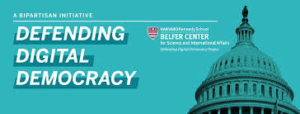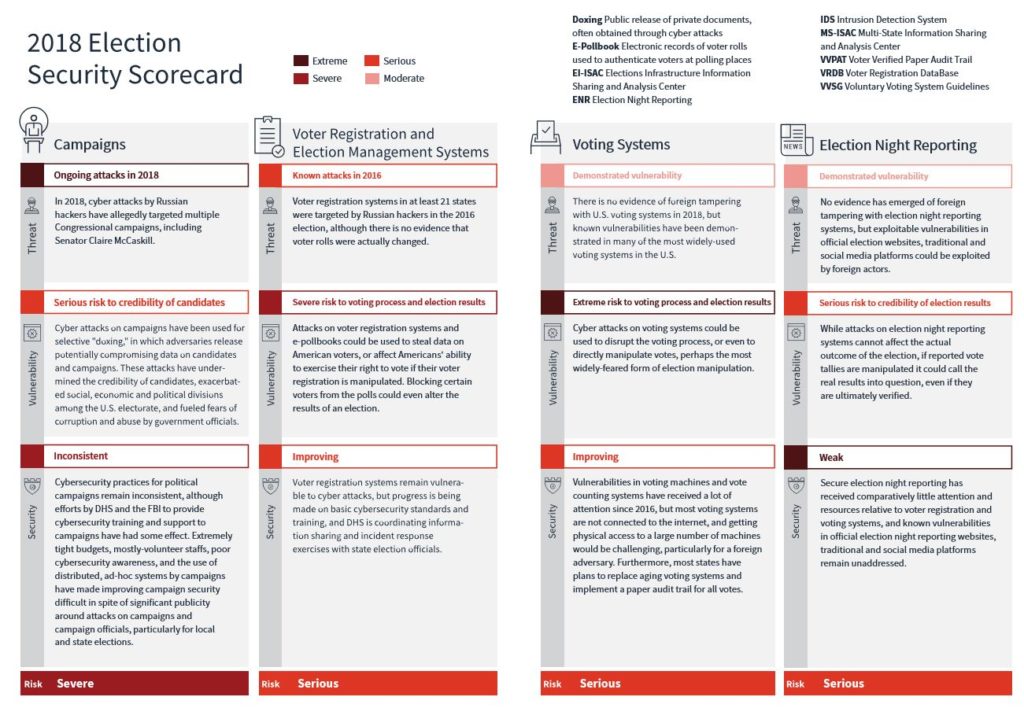More than 120 state and local election officials, communications directors, IT managers, and secretaries of state ran drills simulating security catastrophes that could happen on the worst Election Day imaginable, PC MAG reports:
 Organized by the Defending Digital Democracy (D3P) project at Harvard, a bipartisan effort to protect democratic processes from cyber and information attacks, the drills forced participants to respond to one nightmare scenario after another—voting machine and voter database hacks, distributed denial of service (DDoS) attacks taking down websites, leaked misinformation about candidates, fake polling information disseminated to suppress votes, and social media campaigns coordinated by nation-state attackers to sow distrust.
Organized by the Defending Digital Democracy (D3P) project at Harvard, a bipartisan effort to protect democratic processes from cyber and information attacks, the drills forced participants to respond to one nightmare scenario after another—voting machine and voter database hacks, distributed denial of service (DDoS) attacks taking down websites, leaked misinformation about candidates, fake polling information disseminated to suppress votes, and social media campaigns coordinated by nation-state attackers to sow distrust.
To counter such threats, CSIS has developed an Election Cybersecurity Scorecard, writes William A. Carter, Deputy Director and Fellow at the CSIS Technology Policy Program (see below).
 At the onset of the digital revolution, there was significant hope – and indeed an expectation – that digital technologies would be a boon to democracy, freedom and societal engagement, notes Ann Mettler, the head of the European Political Strategy Centre, the European Commission’s in-house think tank. Yet today, we are witnessing the rise of what might be dubbed as ‘digital authoritarianism,’ she writes in the preface to Election Interference in the Digital Age: Building Resilience to Cyber-Enabled Threats:
At the onset of the digital revolution, there was significant hope – and indeed an expectation – that digital technologies would be a boon to democracy, freedom and societal engagement, notes Ann Mettler, the head of the European Political Strategy Centre, the European Commission’s in-house think tank. Yet today, we are witnessing the rise of what might be dubbed as ‘digital authoritarianism,’ she writes in the preface to Election Interference in the Digital Age: Building Resilience to Cyber-Enabled Threats:
- Given the confluence of potential challenges, we must find the courage to take an honest and unsentimental look at the state of play of election interference driven by cyber threats. At stake is nothing less than people’s trust in our institutions – without which our democracies cannot function.
- Our adversaries certainly know that, which is precisely why they are using digital tools to disrupt and sow doubt. This is proving not only much more potent than many traditional forms of attack, but also significantly cheaper and more difficult to prove – and ultimately prosecute. That is why I strongly believe that the institutions and processes that underpin our electoral systems deserve to be classified as critical infrastructure. …
- Nor should we be afraid to consider requesting that platforms better know their customers at a time when foreign or domestic actors so actively polarise our societies under the shelter of anonymity or fake accounts. ….
- Finally, we must seek to bolster the resilience of our societies against interference, by supporting innovative approaches by start-ups, NGOs and volunteers wanting to help protect democracy at this critical moment in time. RTWT








